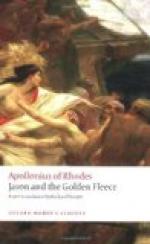Father Zeus, surely great wonder rises in my mind, seeing that dire destruction meets us not from disease and wounds alone, but lo! even from afar, may be, it tortures us! So Talos, for all his frame of bronze, yielded the victory to the might of Medea the sorceress. And as he was heaving massy rocks to stay them from reaching the haven, he grazed his ankle on a pointed crag; and the ichor gushed forth like melted lead; and not long thereafter did he stand towering on the jutting cliff. But even as some huge pine, high up on the mountains, which woodmen have left half hewn through by their sharp axes when they returned from the forest—at first it shivers in the wind by night, then at last snaps at the stump and crashes down; so Talos for a while stood on his tireless feet, swaying to and fro, then at last, all strengthless, fell with a mighty thud. For that night there in Crete the heroes lay; then, just as dawn was growing bright, they built a shrine to Minoan Athena, and drew water and went aboard, so that first of all they might by rowing pass beyond Salmone’s height.
But straightway as they sped over the wide Cretan sea night scared them, that night which they name the Pall of Darkness; the stars pierced not that fatal night nor the beams of the moon, but black chaos descended from heaven, or haply some other darkness came, rising from the nethermost depths. And the heroes, whether they drifted in Hades or on the waters, knew not one whit; but they committed their return to the sea in helpless doubt whither it was bearing them. But Jason raised his hands and cried to Phoebus with mighty voice, calling on him to save them; and the tears ran down in his distress; and often did he promise to bring countless offerings to Pytho, to Amyclae, and to Ortygia. And quickly, O son of Leto, swift to hear, didst thou come down from heaven to the Melantian rocks, which lie there in the sea. Then darting upon one of the twin peaks, thou raisedst aloft in thy right hand thy golden bow; and the bow flashed a dazzling gleam all round. And to their sight appeared a small island of the Sporades, over against the tiny isle Hippuris, and there they cast anchor and stayed; and straightway dawn arose and gave them light; and they made for Apollo a glorious abode in a shady wood, and a shady altar, calling on Phoebus the “Gleamer,” because of the gleam far-seen; and that bare island they called Anaphe,[1] for that Phoebus had revealed it to men sore bewildered. And they sacrificed all that men could provide for sacrifice on a desolate strand; wherefore when Medea’s Phaeacian handmaids saw them pouring water for libations on the burning brands, they could no longer restrain laughter within their bosoms, for that ever they had seen oxen in plenty slain in the halls of Alcinous. And the heroes delighted in the jest and attacked them with taunting words; and merry railing and contention flung to and fro were kindled among them. And from that sport of the heroes such scoffs do the women fling at the men in that island whenever they propitiate with sacrifices Apollo the gleaming god, the warder of Anaphe.




